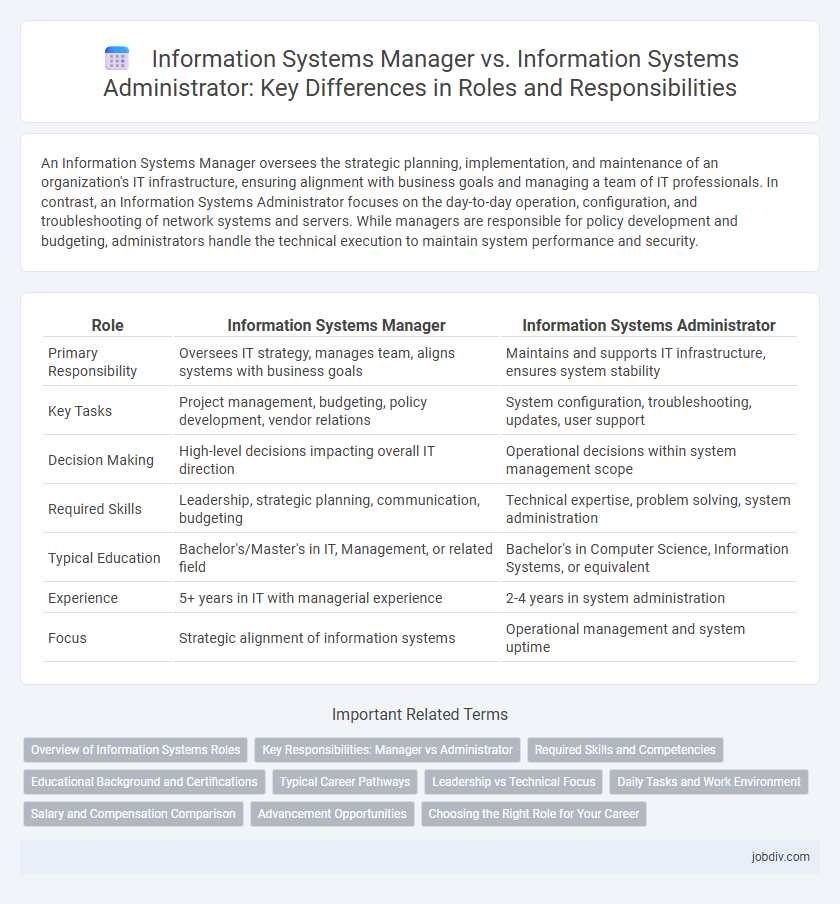An Information Systems Manager oversees the strategic planning, implementation, and maintenance of an organization's IT infrastructure, ensuring alignment with business goals and managing a team of IT professionals. In contrast, an Information Systems Administrator focuses on the day-to-day operation, configuration, and troubleshooting of network systems and servers. While managers are responsible for policy development and budgeting, administrators handle the technical execution to maintain system performance and security.
Table of Comparison
| Role | Information Systems Manager | Information Systems Administrator |
|---|---|---|
| Primary Responsibility | Oversees IT strategy, manages team, aligns systems with business goals | Maintains and supports IT infrastructure, ensures system stability |
| Key Tasks | Project management, budgeting, policy development, vendor relations | System configuration, troubleshooting, updates, user support |
| Decision Making | High-level decisions impacting overall IT direction | Operational decisions within system management scope |
| Required Skills | Leadership, strategic planning, communication, budgeting | Technical expertise, problem solving, system administration |
| Typical Education | Bachelor's/Master's in IT, Management, or related field | Bachelor's in Computer Science, Information Systems, or equivalent |
| Experience | 5+ years in IT with managerial experience | 2-4 years in system administration |
| Focus | Strategic alignment of information systems | Operational management and system uptime |
Overview of Information Systems Roles
Information Systems Managers oversee the strategic planning, implementation, and management of an organization's IT infrastructure, ensuring alignment with business goals. Information Systems Administrators focus on the day-to-day operation, maintenance, and support of hardware, software, and network systems to ensure optimal performance. Both roles are critical for maintaining efficient, secure, and reliable information systems within an organization, with managers emphasizing leadership and administration focusing on technical execution.
Key Responsibilities: Manager vs Administrator
Information Systems Managers oversee strategic planning, budget management, and coordination of IT projects to align technology initiatives with business objectives. Information Systems Administrators focus on daily network maintenance, system security, user support, and troubleshooting technical issues to ensure smooth operational performance. While managers lead overall IT strategy and team management, administrators handle hands-on system implementation and routine infrastructure management.
Required Skills and Competencies
Information Systems Managers require advanced leadership abilities, strategic planning skills, and expertise in project management to oversee IT infrastructure, ensuring alignment with organizational goals. Information Systems Administrators need strong technical proficiency in network configuration, database management, and system security to maintain and troubleshoot IT systems effectively. Both roles demand problem-solving capabilities, knowledge of cybersecurity protocols, and familiarity with enterprise software platforms.
Educational Background and Certifications
Information Systems Managers typically hold a bachelor's or master's degree in information technology, computer science, or business administration, complemented by certifications such as PMP, CISSP, or ITIL to demonstrate leadership and project management skills. Information Systems Administrators often possess an associate's or bachelor's degree in information technology or computer science, with certifications like CompTIA Network+, Microsoft Certified Systems Administrator (MCSA), or Cisco's CCNA emphasizing technical proficiency in system management and network administration. Both roles benefit from continuous education and specialized certifications to stay current with evolving technology and industry standards.
Typical Career Pathways
Information Systems Managers often progress from roles such as Information Systems Administrators, gaining experience in system maintenance and network management before advancing to strategic planning and team leadership positions. Career pathways for Information Systems Administrators typically start with technical support or IT technician roles, emphasizing hands-on hardware and software troubleshooting skills. Both positions require continuous skill development in emerging technologies, with managers focusing on project management and business alignment while administrators prioritize system stability and user support.
Leadership vs Technical Focus
Information Systems Managers prioritize leadership, overseeing strategic planning, team coordination, and resource allocation to align IT initiatives with organizational goals. Information Systems Administrators concentrate on technical tasks, such as system maintenance, network configuration, and troubleshooting to ensure optimal performance and security. The manager's role emphasizes decision-making and cross-departmental collaboration, while the administrator's role focuses on hands-on system management and technical problem-solving.
Daily Tasks and Work Environment
Information Systems Managers oversee the planning, coordination, and direction of IT-related activities within an organization, focusing on strategic decision-making and team leadership. Information Systems Administrators handle the daily maintenance, configuration, and reliable operation of computer systems and servers, ensuring network security and system availability. Managers typically work in office settings with frequent meetings, while administrators spend more time performing hands-on technical tasks in data centers or IT departments.
Salary and Compensation Comparison
Information Systems Managers typically earn higher salaries than Information Systems Administrators, with median annual wages around $150,000 compared to $80,000, reflecting the greater level of responsibility and strategic oversight. Compensation packages for managers often include bonuses, stock options, and benefits, while administrators usually receive standard pay and benefits without significant performance-based incentives. Industry demand and geographic location also significantly influence the salary ranges for both roles, with tech hubs offering premium compensation.
Advancement Opportunities
Information Systems Managers typically experience broader advancement opportunities by overseeing strategic IT initiatives and leading departmental teams, positioning themselves for executive roles like Chief Information Officer (CIO). Information Systems Administrators often advance by gaining specialized technical certifications and experience, allowing progression into senior technician roles or transitioning into management positions. Both roles benefit from continuous skill development, but managers generally access higher-tier leadership pathways within the organizational hierarchy.
Choosing the Right Role for Your Career
Information Systems Managers oversee strategic planning, project management, and team leadership to ensure efficient IT operations, making them ideal for career growth in leadership and decision-making roles. Information Systems Administrators focus on maintaining, troubleshooting, and securing IT infrastructure, offering hands-on technical expertise crucial for operational stability. Selecting the right role depends on whether you prefer managing IT resources and strategy or engaging in day-to-day system administration and support.
Information Systems Manager vs Information Systems Administrator Infographic

 jobdiv.com
jobdiv.com